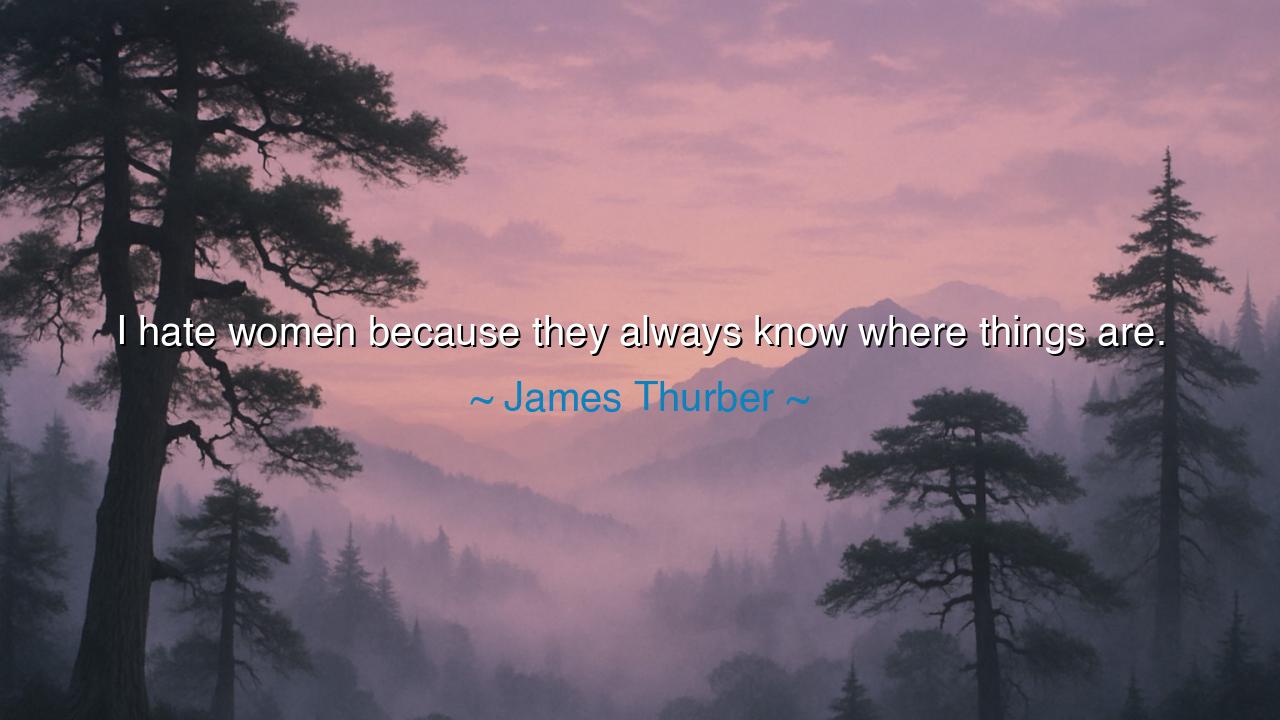
I hate women because they always know where things are.






The words of James Thurber — “I hate women because they always know where things are.” — though clothed in jest, conceal a truth of enduring depth. It is the humor of a man who has recognized, perhaps begrudgingly, the mysterious wisdom and intuition that women often bear. For in the laughter of satire lies a confession: man, for all his strength, is often blind to the order that quietly sustains his life, while woman, with unseen art, preserves it.
This utterance, born of comedy, may at first appear as mockery, but it reveals the eternal balance between the sexes. The ancients spoke of harmony between masculine force and feminine insight. The warrior may wield his sword in the field, yet it is the quiet hand of his companion that knows where the shield rests, or where the bread is kept to nourish him when he returns weary. Thus Thurber’s jest is also acknowledgment, that knowledge of place and memory of order are themselves a kind of power.
Consider the tale of Penelope, wife of Odysseus. For twenty years she waited, weaving and unweaving her web, knowing the place of every thread and the hour of every move. While suitors crowded her hall with arrogance, she preserved the kingdom through cunning and remembrance. Odysseus conquered Troy with might, but Penelope defended Ithaca with wisdom. Here we see the same truth: the knowing of women sustains the world when men are adrift.
The jest of Thurber reminds us that what is dismissed as small — the knowledge of where things are — is in truth no small power. It is the weaving of order from chaos, the remembrance that prevents waste, the foresight that spares delay. To laugh at this gift is to laugh at the hidden architecture of life itself. And yet the laughter is affectionate, for it is born not of disdain, but of admiration cloaked in irony.
Therefore, let future generations not mistake such words as bitterness, but as a parable. The balance of man and woman lies not only in strength and passion, but in memory and foresight. For when one knows where things are, the path forward is made clear, and when both powers unite, households, cities, and nations endure. Thurber, with his sharp humor, thus leaves us a truth: even in jest, wisdom shines.






PNGia Han Pham Nguyen
This quote from Thurber plays with the idea that women are always in control of the household, but it’s interesting how it frames this as a negative. How much of this humor is rooted in the stereotype that men can’t keep track of things and need women’s help? Does it reflect the frustration of men who feel less organized or is it just a playful exaggeration? How can we move past these simplistic portrayals of gender dynamics?
AHAn Hoai
James Thurber’s quote might be funny to some, but it raises questions about how we view gender differences. Is it really something to ‘hate’ when women know where things are? Shouldn’t that be seen as a useful trait? Maybe the real issue is how men and women have historically been expected to perform different roles. Does this quote perpetuate the idea that men should be ‘helpless’ in the home, and women should take charge?
TDHoai Trinh-28 D17
The humor in Thurber’s quote seems harmless at first, but does it unintentionally undermine women by portraying their organizational skills as something to be hated or resented? Is this just playful banter, or does it reflect a deeper frustration with gendered expectations? How does this type of humor influence the way we see men and women in domestic roles and relationships?
HAHa Anh
While James Thurber might be trying to make a lighthearted comment, there’s something troubling about framing women’s ability to keep track of things as a negative trait. What does this say about how men and women view each other in domestic spaces? Could this quote be a critique of how gender roles often manifest in homes, or is it just a funny exaggeration? Should we laugh at these stereotypes, or challenge them?
GHTrinh gia huy
James Thurber’s quote seems like it’s meant to be humorous, but it could also be interpreted as reinforcing a stereotype about women being ‘better’ at certain household tasks. Does it play into the idea that men are clueless when it comes to organizing or finding things? How does this type of humor reflect the outdated roles and expectations that society once placed on men and women? Is it really just a joke, or does it subtly perpetuate gender norms?